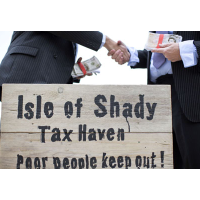Offshore Tax Havens Cost U.S. $184 Billion in Revenue Every Year
 (photo: Justin Tallis, AFP/Getty Images)
(photo: Justin Tallis, AFP/Getty Images)
American governments, which have struggled with tight budgets since the Great Recession, would have more than $180 billion in additional revenue each year if corporations and wealthy individuals didn’t hide their earnings in offshore accounts.
The federal government loses about $150 billion annually and state governments miss out on about $34 billion collectively because of overseas tax havens, according to a report (pdf) from U.S. PIRG, a liberal public interest group.
Without the combined $184 billion in tax revenue, each U.S. taxpayer on average would have to pay an additional $1,259 in taxes to cover this loss, the report states.
“Tax haven abusers benefit from America’s markets, public infrastructure, educated workforce, security and rule of law—all supported in one way or another by tax dollars—but they avoid paying for these benefits,” stated the report. “Instead, ordinary taxpayers end up picking up the tab, either in the form of higher taxes, cuts to public spending priorities, or increases to the federal debt.”
The biggest users of tax havens are corporations, responsible for $110 billion of the lost revenue. In fact, 82 of the top 100 companies in the U.S. hid at least some of their monies in foreign accounts, U.S. PIRG says.
Corporations singled out in the report include Pfizer, which did not pay income taxes between 2010 and 2012, even though it made $43 billion worldwide. On top of that, the company was paid more than $2 billion in federal tax refunds. As of last year, it had $69 billion sheltered from the Internal Revenue Service (IRS) in tax haven countries.
Computer giant Microsoft “stashed $76.4 billion overseas in 2013” with the help of five foreign subsidiaries that function as tax havens, the report says.
Citigroup kept $43.8 billion from being taxed by the IRS last year, saving it nearly $12 billion in taxes. In 2008, Citigroup was bailed out by taxpayers in the wake of the U.S. financial crisis.
-Noel Brinkerhoff
To Learn More:
Picking Up the Tab 2014: Average Citizens and Small Businesses Pay the Price for Offshore Tax Havens (U.S. PIRG) (pdf)
Quick Fix Could Net California a Quarter Billion Dollars Lost to Offshore Tax Dodges (by Ken Broder, AllGov California)
California-Based Apple Uses Irish Subsidiary to Dodge Billions in Taxes (by Ken Broder, AllGov California)
Silicon Valley Firms Stash Billions Offshore but Don’t Report Tax Benefit (by Ken Broder, AllGov California)
- Top Stories
- Unusual News
- Where is the Money Going?
- Controversies
- U.S. and the World
- Appointments and Resignations
- Latest News
- Trump to Stop Deportations If…
- Trump Denounces World Series
- What If China Invaded the United States?
- Donald Trump Has a Mental Health Problem and It Has a Name
- Trump Goes on Renaming Frenzy






Comments